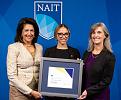Marketing Coordinator
- FMA
- The Fabricator
- FABTECH
- Canadian Metalworking
Find your funding
Canada’s Regional Relief and Recovery Fund helps Canadian businesses during COVID-19
- By Alena Barreca
- January 26, 2021
At the end of November 2020, the government of Canada released the 2020 Fall Economic Statement (FES) titled “Supporting Canadians and Fighting COVID-19.” Focusing primarily on the support from the Regional Relief and Recovery Fund (RRRF), the FES report highlights details about RRRF statistics, projections, and strategy plans as they relate to COVID-19 support for Canadian health, safety, business, and jobs.
The FES states that since its launch in May 2020, the RRRF has supported more than 15,000 businesses in Canada, including more than 5,000 women-owned organizations and more than 8,500 rural companies, saving around 100,000 jobs during the ongoing global COVID-19 pandemic.
What is the RRRF?
The RRRF provides repayable, interest-free loans that support the fixed operating costs of Canadian businesses that cannot meet the eligibility criteria to receive funding through other federal and provincial COVID-19 support programs.
The RRRF recently was extended and expanded in southern Ontario, and businesses may now receive loans for retroactive costs from March 15, 2020, until March 31, 2021, for up to a maximum of $1 million. And select not-for-profit organizations now are eligible for funding.
The expense deadline of March 31, 2021, for RRRF support is fast approaching, so it’s a good idea to apply soon to receive interest-free loans to support your economic plans during the pandemic.
Economic Statement
The federal government’s 2020 FES highlights an ongoing action plan, including proposed measures to continue protecting Canadians’ health, businesses, and jobs to maintain strong economic growth and stability. The full 2020 report can be accessed at www.budget.gc.ca/fes-eea/2020/report-rapport/toc-tdm-en.html.
A few of these major planning measures include:
- A new Highly Affected Sectors Credit Availability Program that provides government funding in low-interest loans for hardest hit businesses, including those in sectors like tourism and hospitality, hotels, and arts and entertainment.
- A $206 million investment over two years, starting in 2020-21, to regional development agencies for a new Regional Air Transportation initiative.
- Extending the 25 per cent “top-up” to the Canada Emergency Rent Subsidy until March 13, 2021.
- Extending the Canada Emergency Response Benefit for an additional four weeks.
- Increasing the maximum Canada Emergency Wage Subsidy rate to 75 per cent for the period beginning Dec. 20, 2020, and extending this rate until March 13, 2021.
The RRRF will continue to support Canadian businesses, and the government is anticipating an additional investment of up to $500 million, bringing total funding to more than $2 billion, but these changes have not yet been announced.
Alena Barreca is marketing coordinator for Mentor Works, 28 Bett Court, Unit B, Guelph, Ont. N1C 0A5, 888-599-3111, www.mentorworks.ca.
subscribe now


Keep up to date with the latest news, events, and technology for all things metal from our pair of monthly magazines written specifically for Canadian manufacturers!
Start Your Free SubscriptionAbout the Author
- Video Showcase
- Industry Events
MME Saskatoon
- May 28, 2024
- Saskatoon, SK Canada
CME's Health & Safety Symposium for Manufacturers
- May 29, 2024
- Mississauga, ON Canada
DiPaolo Machine Tools Open House 2024
- June 4 - 5, 2024
- Mississauga, ON Canada
FABTECH Canada
- June 11 - 13, 2024
- Toronto, ON Canada
Zoller Open House & Technology Days 2024
- June 12 - 13, 2024
- Ann Arbor, MI





















